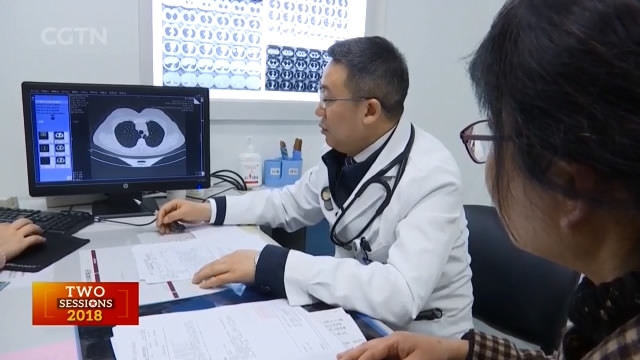
21:15, 12-Mar-2018
Deputy & Doctor: Hospital president serves as voice of Sichuan during Two Sessions

Dr. Li has been busy since he came to Beijing for the Two Sessions. For a quick checkup on where his proposal stand, and how he feels about being a newly-elected NPC deputy, our reporter Zou Yun caught up with him in the capital.
Most of his time is spent with patients. But for the past few weeks, it was with his proposals. As a newly-elected NPC deputy, Dr. Li Weimin knows he has to adjust to this new role fast.
LI WEIMIN, PRESIDENT WEST CHINA HOSPITAL "I'm here not just on behalf of myself, but numerous doctors as well as patients. Being an NPC deputy is a great honor, but what is even greater is the responsibility."
During the Two Sessions, his workplace has switched from hospitals to the Great Hall of the People, but his priority remains the same, his patients. Dr. Li has come from Sichuan, a province populated by ethnic minorities. His top concern is the formidable lack of medical resources in poorer regions, especially qualified staff.
LI WEIMIN, PRESIDENT WEST CHINA HOSPITAL "In some hospitals at the prefecture level, there are only a dozen professional doctors. Not only does the quantity fall behind, but also the quality. Most of them didn't go through the standard training for resident doctors."
Dr. Li's proposal centers around enabling a better flow of doctor exchanges and sustainable improvement in medical services in poorer ethnic minority regions. He wants to link prefecture-level hospitals to first-tier hospitals in a medical services alliance. But Dr. Li said, to make this proposal a reality, it needs the support of the government. And that is what he, as a deputy of the people, is here for.
LI WEIMIN, PRESIDENT WEST CHINA HOSPITAL "I shared my proposal with other NPC deputies, they think this is a feasible suggestion. Therefore, if the government, rather than voluntary efforts, could play a leading role, it would be much more effective in making high quality medical services more accessible to ethnic minority regions."
ZOU YUN BEIJING Even though the proposals of CPPCC members are not legally binding, their suggestions and inputs are greatly valued. And if the proposal of Dr. Li's is accepted, it will not only provide a new approach to "Regional Medical Alliance", but also lead to more sustainable and higher quality medical services for ethnic minorities. ZY, CGTN, BJ

SITEMAP
Copyright © 2018 CGTN. Beijing ICP prepared NO.16065310-3
Copyright © 2018 CGTN. Beijing ICP prepared NO.16065310-3